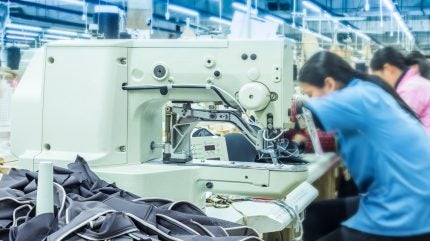
The report concentrates on the issue of forced labour within the international supply chains of products that are imported into or sold within the UK market.
It specifically excludes matters related to forced labour occurring domestically within the UK, as well as concerns surrounding human trafficking to or within the country.

Discover B2B Marketing That Performs
Combine business intelligence and editorial excellence to reach engaged professionals across 36 leading media platforms.
The report cautions that the widespread nature of human rights violations in crucial industries makes it almost certain that goods produced under such conditions are being sold in the UK, due to the absence of effective protective measures.
Current UK legal and regulatory structures fail to adequately address the complexities associated with abuses in global supply chains.
The UK imports goods valued at over $26bn from five sectors known for high incidences of forced labour: electronics, garments, fish, timber, and textiles.
Specific example of forced labour in UK supply chain
During its investigation, the JCHR said it was made aware of specific instances of forced labour connected to UK supply chains, notably in the cotton industry.

US Tariffs are shifting - will you react or anticipate?
Don’t let policy changes catch you off guard. Stay proactive with real-time data and expert analysis.
By GlobalDataAn estimated one in five cotton garments globally may be tied to forced labour practices from China’s Xinjiang region.
Rahima Mahmut, the UK director at the World Uyghur Congress, testified about the discriminatory forced labour and relocation that Uyghurs and other ethnic minorities face in China.
Despite a ruling by the Court of Appeal in the case R (World Uyghur Congress) v National Crime Agency, Mahmut suggests there is a lack of action in using Proceeds of Crime Act (POCA) powers.
Mahmut informed the committee on 22 January 2025, that since a judgment in July 2024, the National Crime Agency had not yet resolved whether it would investigate potential links between cotton imports and forced labour as highlighted by the World Uyghur Congress.
When the NCA met with the committee on 23 April 2025, this issue remained unaddressed, and as of 3 July, no public statement had been issued by the NCA regarding this matter.
“Due to legislative lacuna, we had to resort to criminal law and the Proceeds of Crime Act as there is currently no other law. The lack of a law in the UK is shocking. It is an outlier,” Mahmut told the committee.
Recommendations for combatting forced labour within UK’s imported fashion and textile products
The report suggests that businesses should be required to conduct thorough due diligence on their supply chains, facing penalties if they do not comply.
Additionally, it recommends creating legal avenues for victims to pursue justice in UK courts.
The report advocates for the implementation of import bans on goods associated with forced labour, aligning with actions taken by the US and European Union.
It calls on the government to clearly define who is responsible for detecting and confiscating these illicit goods and to set up strong oversight systems for enforcing new import restrictions.
The Joint Committee on Human Rights chair Lord David Alton said: “Over the course of this inquiry we have seen shocking evidence of human rights abuses in a wide range of industries that are a major part of UK trade. Other nations have progressed in eradicating these appalling abuses from their supply chains, but the UK has been left behind.”
Industry organisations call for swift UK government action
Following the release of JCHR’s report on Forced Labour in UK Supply Chains, a joint statement was issued by industry organisations, including the Ethical Trading Initiative, British Retail Consortium, Corporate Justice Coalition, and Trades Union Congress.
They endorsed the committee’s recommendation for mandatory Human Rights and Environmental Due Diligence (mHREDD) legislation to hold businesses accountable for preventing human rights violations and environmental damage in their supply chains.
The organisations advocate for swift government action to establish responsible business practices as a standard rather than an exception.
Modern slavery continues to be a widespread problem, with more than 27m individuals globally subjected to forced labour and illegal profits amounting to $236bn generated annually, according to the statement.
Corporate Justice Coalition director Dominique Muller said: “A strong Business, Human Rights and Environment Act will tackle forced labour, human rights abuses, and environmental harm across both private and public sectors. We look forward to working with the government on the Business, Human Rights and Environment Act to promote legislation with clear rules, tough enforcement, and real remedies — for companies and the communities they impact.”
Earlier this month (July), an investigation conducted by the human rights advocacy group Labour Behind the Label uncovered “exploitative working conditions in factories” that provide goods to merchants selling on Amazon UK.





